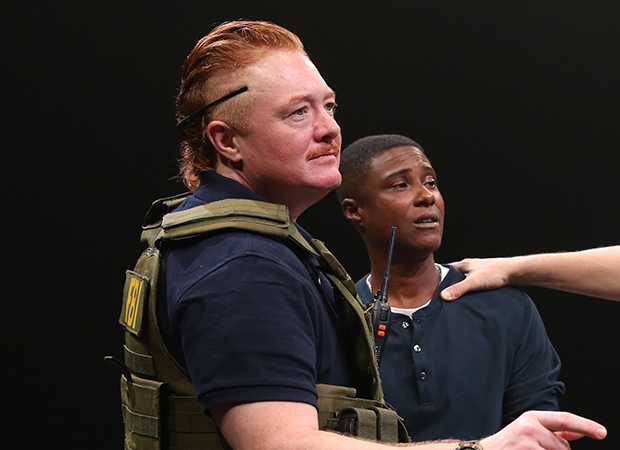In Is This a Room, Becca Blackwell Brings Awareness to a Whistle-Blower Case
Blackwell stars in Tina Satter’s new stage work at the Vineyard Theatre.
Becca Blackwell first came to the attention of the mainstream theater crowd in Madeleine George's Hurricane Diane, a queering of The Bacchae where Blackwell played a Greek god disguised as a landscaper who seduced suburban housewives and made them aware of global warming.
While Hurricane Diane, which ran earlier this year, was many people's first introduction to this trans writer and performer, Blackwell has been on the scene for at least 20 years. Despite the theater industry's relatively recent commitments to diversity, Blackwell has either had to make their own art for decades just to be seen (like their acclaimed solo show They, Themselves, and Schmerm) or relied on theater-makers like George, Young Jean Lee, and Tina Satter to put them in shows.
Blackwell's longtime collaboration with Satter has led to the role of "Unknown Male" in Satter's Is This a Room at the Vineyard Theatre. The new work brings to the stage the real-life FBI interrogation of Reality Winner, an NSA contractor charged with leaking a classified report suggesting that Russian hackers had access to American voting software. Is This a Room stages the transcripts of Winner's grilling verbatim.
Winner currently sits in jail, having been sentenced in 2018 to five years and three months. The production, as Blackwell views it, is bringing awareness to this case, of which not many people know the intricacies. At the same time, Blackwell's appearance itself is bringing an equal amount of awareness to the struggles of performers who don't fit in regularly prescribed boxes. "I feel bad sometimes," Blackwell admits of the rehearsal process for Is This a Room, "because I think I was a real pain in the ass. But this story is important, and that's why I'm doing it.'

(© Carol Rosegg)
This interview has been condensed and edited for clarity.
When did the Reality Winner case first capture your attention?
I read the same New York Magazine article about it that Tina did. They linked to the public domain FBI transcripts, and she called me up saying she wanted to read through them. I remembered how Reality Winner was being made out to be an idiot in the media, but the article was a little more nuanced. We read through the transcripts, and it was like "Holy s*it, this is real? This reads like a play." It was insane.
The interrogation happened June 3, 2017. We were looking at the transcript in December 2017 after it became public domain. Tina and [cast member] Emily Davis then went to Berkeley and really worked on taking the transcript and putting it in more of a script-ish form. But we kept it as it was written in the transcript. It says "unidentified sound," "overlapping," all of that.
How did the "Unknown Male" character that you play come into it?
The play is literally verbatim, so it became clearer and clearer that there was a character called "Unknown Male," [as there was in the transcript]. This "Unknown Male" was something that I, just by nature, would play, because what Tina does in most of her work is elevate the feminine or queer or non-cis male, and the masculine people she uses are usually trans-masculine or nonbinary people.
I feel like a lot of people don't know much about this particular situation.
It's because no one is talking about this woman. I think [fellow whistle-blower] Chelsea Manning had way more support because she's trans, and there's a huge trans contingency on Twitter that's very vocal and loud and powerful in their online presence. They were elevating her. There wasn't a huge contingency of 20-year-old white, blond, blue-eyed women being like, "This is our sister." Reality doesn't fit any "good liberal" modes: She's a gun-enthusiast, military, white woman from Texas, so in those terms, who cares? She wasn't gonna get the outliers or marginalized or nonwhite or cis people to make noise for her.
It goes to show how in this kind of politics, we aren't unified. If you're fighting the system for the marginalized, you're always like, "Let me fight for my people before I start caring about other people" and that's when you realize that we're all interconnected. You can't not think that you're all pieces in the Jenga game.
Reality is a 25-year-old and she played those guys like a fiddle. You can see it in the transcript. She has more clearance than all those men. She's smarter than all those men. And all those guys kept doing was take her down intellectually, over and over and over. There is huge misogyny in it. Nationalism is based on the patriarchy. No one listens to women.

(© Joan Marcus)
Over the course of your career, have things evolved in the industry for trans performers like yourself?
Most of the work I've gotten is because there were no other actors who had a long-term body of work. I have 20 years of experience just because I didn't drop out. There were years when I only did one piece of work because there was nothing for me or people weren't willing to put me in stuff. My trajectory has always been, "How can I even get in this business when no one even wants to admit I exist?"
Young Jean Lee, Tina Satter, Erin Markey, Madeleine George, Leigh Silverman, those are people who put me in their plays. I didn't get "cast." No institution gave me a chance, quote-unquote, because I'm not mainstream. I'm too queer. There are people who are more palatable to larger institutions, and that's how it's always been.
If I change my name to Brad, I'm sure it'll [get easier]. [laughs] Gay men are way more palatable to the world than gay women; because everything is based on what men think is hot. They want hot divas, not burly dykes, because c*ck is currency in the patriarchy. There's more representation of trans-women of color than there are bull dykes of any race. I do think it's changing in a way, but it's hard to wrap our heads around.







